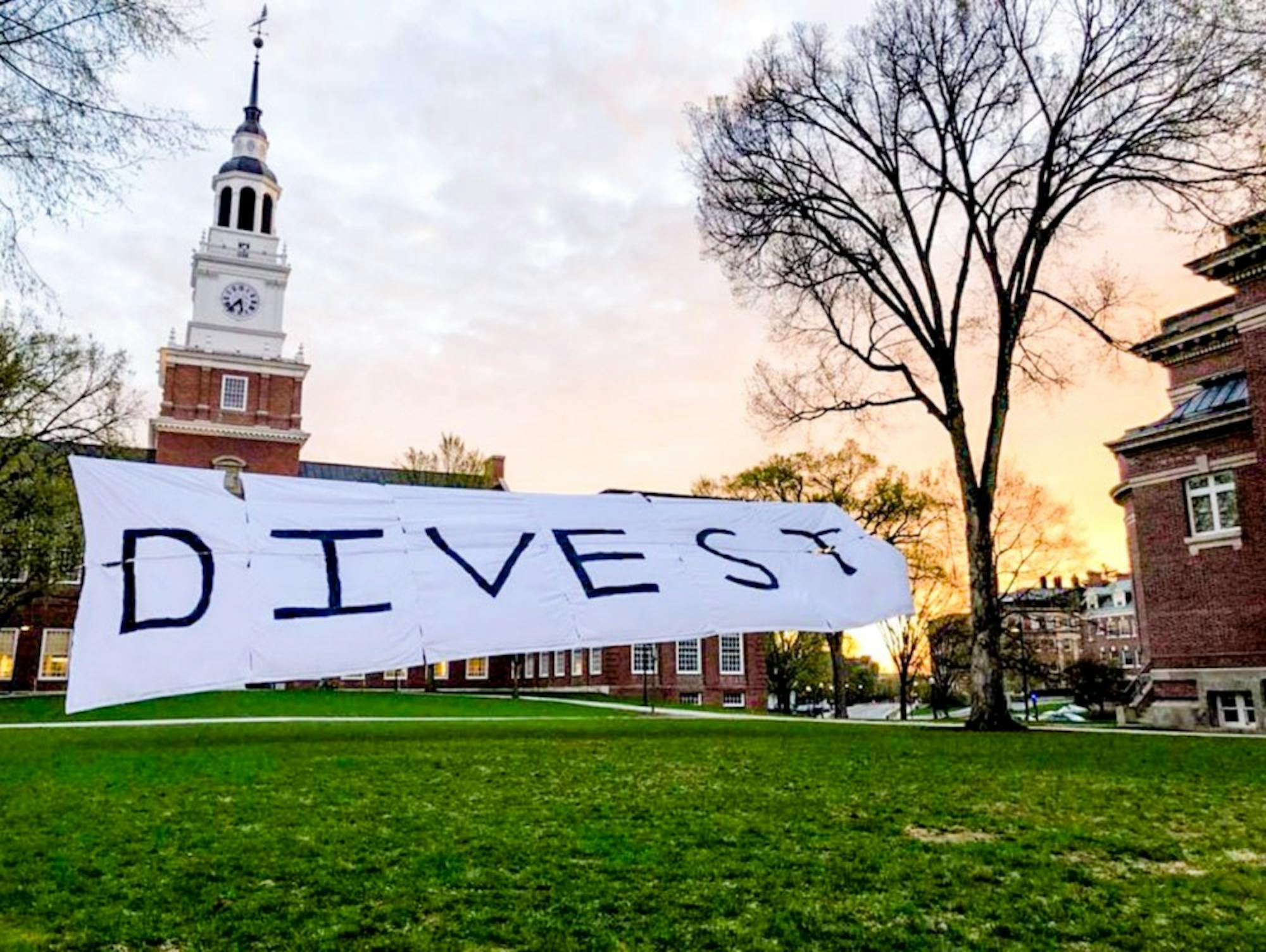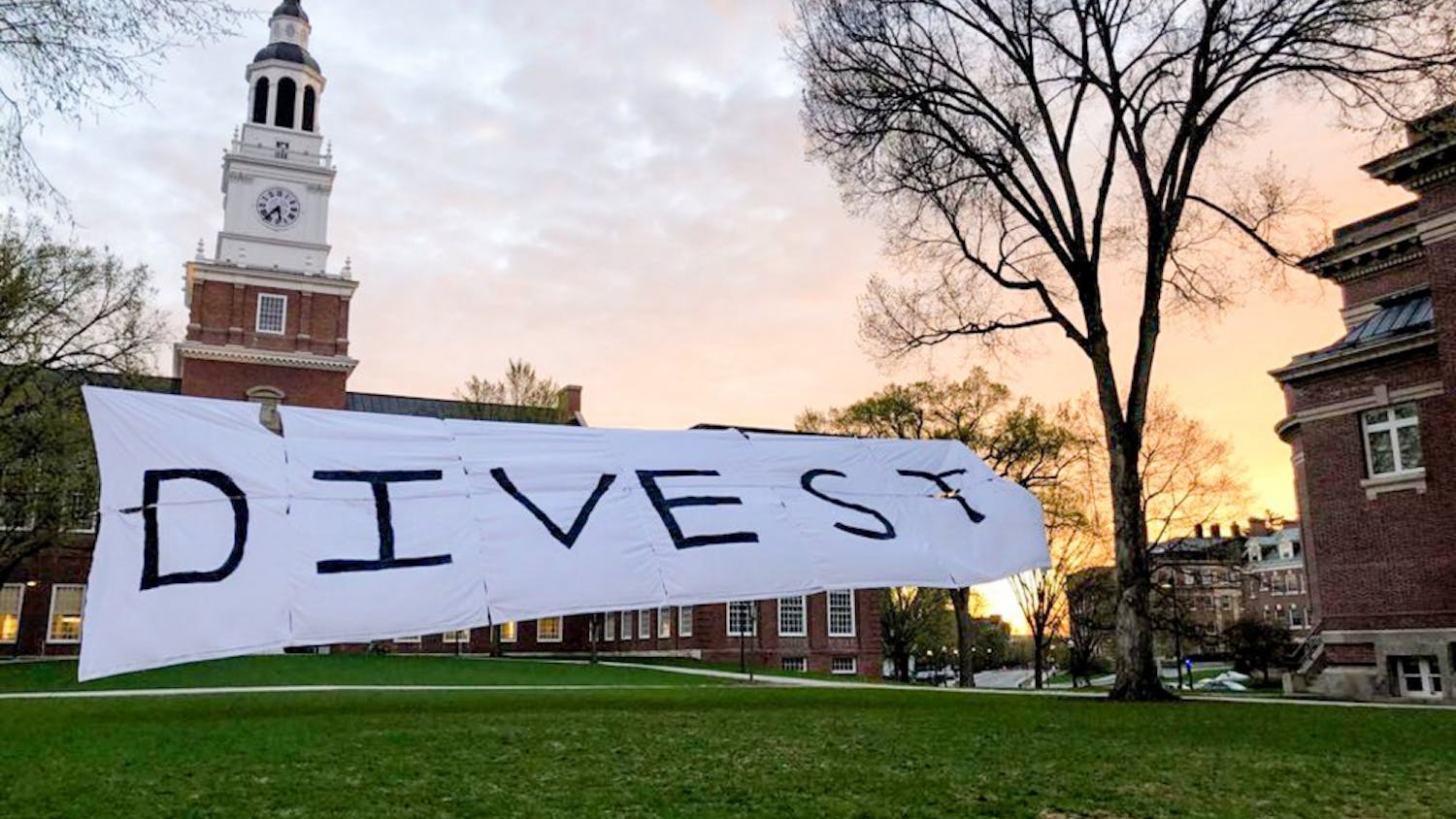The three percent rule states that a small, vocal minority of a population is enough to effect lasting social change through the use of nonviolent actions.
Divest Dartmouth member Lucas Rathgeb ’22 said this rule encapsulates the organization’s mission and activity at the College.
“Regular attendance is about 15 people,” Rathgeb said. The group, he added, is determined to pursue the mission they were founded on in 2012: pushing the administration to “publicly take their investments out of fossil fuels.”
However, this mission has been challenged by new information, with Divest recently learning that the College’s Office of Investment does not actually directly invest in fossil fuel companies. Instead, the only significant manner in which the College directly invests in fossil fuel companies is through two student organizations — the Dartmouth Investment and Philanthropy Program and the Tuck Investment Club — which receive money from the College’s endowment for the purposes of practicing investment.
“Both DIPP and the Tuck Investment Club have money in the endowment to use as their educational tool to practice investment,” said Divest member Connie Lu ’22. “That money is directly invested in the fossil fuel industry. The Dartmouth Investment Office — their policy has recently been to not make direct investments.”
Divest only learned this September that the student clubs — and not the Investment Office itself — are directly investing in fossil fuel companies, according to Lu. The information was disclosed in an email following a meeting that Divest members attended with College President Phil Hanlon, the Board of Trustees and the Office of Investment in order to present their requests. In an email to Divest members, Hanlon wrote that almost all of the College’s direct fossil fuel investments are in the two student-run portfolios.
Despite this new information, members of Divest said they are standing by their mission. Lu said that the new information does not change Divest’s overall goals.
“The point was never that we had a huge amount of money invested,” Lu said. “Where the impact comes from in divestment is making a public statement that the fossil fuel industry is not in alignment with Dartmouth’s values as an educational institution. We believe that they can make that regardless of whether they have direct investments.”
Lu noted that the College may still invest indirectly in fossil fuel companies, but because those are difficult to track, Divest is focusing its efforts on eliminating direct investment.
Lu also said that the climate research the College undertakes should be backed by concrete action.
“We see that doing research on all the harms and effects of climate change and not taking action to actually combat what you are writing about in your research [are] antithetical, because the point of conducting all of this research is actually being able to respond to these problems,” Lu said.
According to Lu, Divest is asking Dartmouth to publicly disclose its direct investments and withdraw those in fossil fuel companies designated as harmful by the Union of Concerned Scientists.
In an email statement, College spokesperson Diana Lawrence wrote that Hanlon has met with Divest members and believes that addressing climate change is “perhaps the greatest challenge of our time.”
“As he has often said, the most significant opportunity Dartmouth has to impact our global energy future comes directly from our mission,” Lawrence wrote. “Through the production of research and leadership preparation for our students, Dartmouth can make significant contributions to this critical issue.”
According to Rathgeb, one of the pieces of evidence on which Divest bases its request is a 2016 report commissioned by Hanlon that looks at the effects of divestment. The report, titled “Report to the President on the Considerations Involved in Divesting the Dartmouth College Endowment from Directly Held Fossil‐Fuel Related Assets,” does not come to a definitive conclusion on whether or not to divest from fossil fuels but instead analyzes the effects of a range of decisions.
The report stated that various approaches to divestment will carry “different ethical, financial, academic, and symbolic implications.”
“Because no single option was found to fulfill all objectives to the greatest degree,” the report later stated, “a determination of which option is most preferable overall will depend on a subjective prioritization of objectives.”
Divest members said that the organization continues to run into challenges convincing major actors at the College to act on their cause.
“One thing that the Board of Trustees will say is that the endowment is not used for political reasons, even though there is precedent for that in the past: divesting from Hydro-Québec, tobacco and companies in South Africa [under apartheid],” Rathgeb said.
Another argument against divesting came from Hanlon, according to Rathgeb.
“[Hanlon gave] the slippery-slope argument that if we divest from fossil fuels, people will want to divest from so many different things,” Rathgeb said. “But we know there aren’t other active divestment programs on campus.”
While both Lu and Rathgeb said that they hope Divest will become more prominent on the administration’s radar, Lu stated that improving student engagement is one of Divest’s priorities at the moment.
“Looking at apartheid divestment in the past, huge student mobilization was really the main reason why the administration was pressured to act,” Lu said.
To gain visibility among the student body, Divest organized a “Visibility Week” last week, according to Lu.
“We put flyers around campus, tabled in [Class of 1953 Commons] and Carson every day and gathered signatures for a new petition to be able to show the Board of Trustees and President Hanlon what student support for divestment looks like,” Lu said.
As of Nov. 11, the petition has earned around 150 signatures, according to Lu. As part of the organization’s strategy moving forward, Lu said that Divest intends to gather more support from faculty members and graduate students.
Divest has previously tried to call attention to its mission through protests, banner drops and interrupting an Alumni Council meeting. However, the organization has not utilized similar actions this term.
While Rathgeb describes the relationship Divest had with the administration in the past as “collaborative,” he added that might change in the future.
“We are not being talked about; we are not on the Board’s radar, it seems,” Rathgeb said. “We need to be more public about things, conduct larger actions, possibly [rallies and protests].”
Representatives from DIPP and the Tuck Investment Club did not immediately respond to requests for comment.




